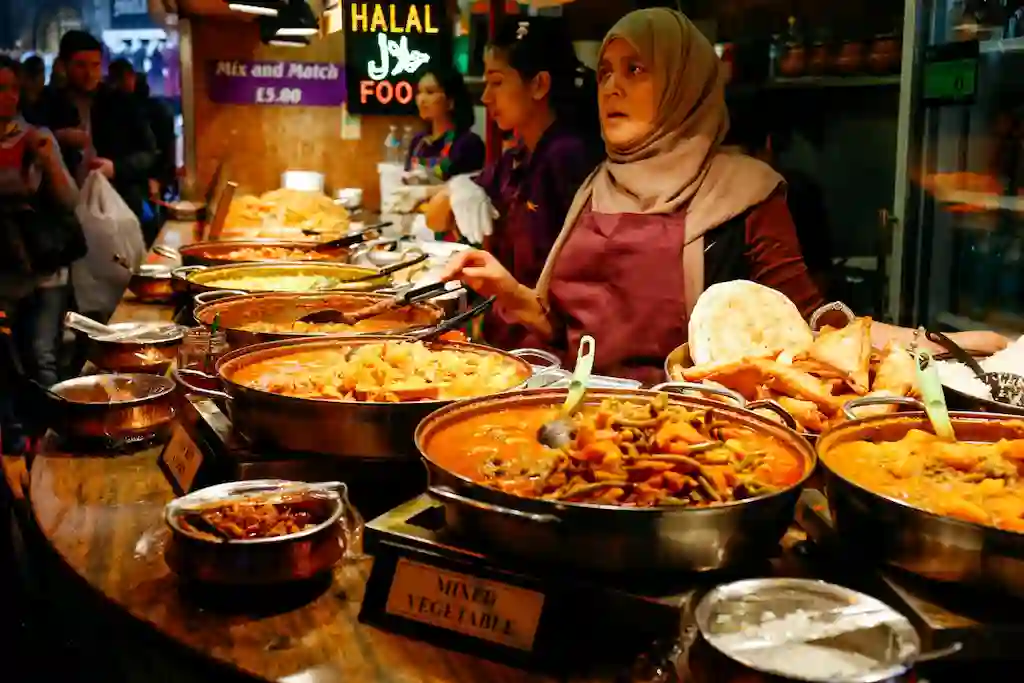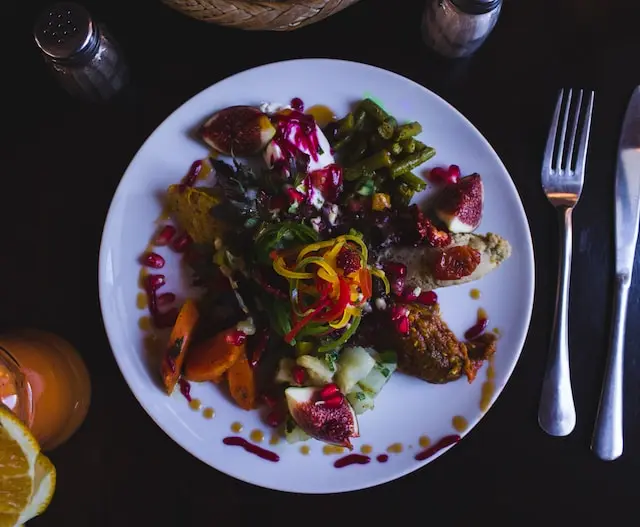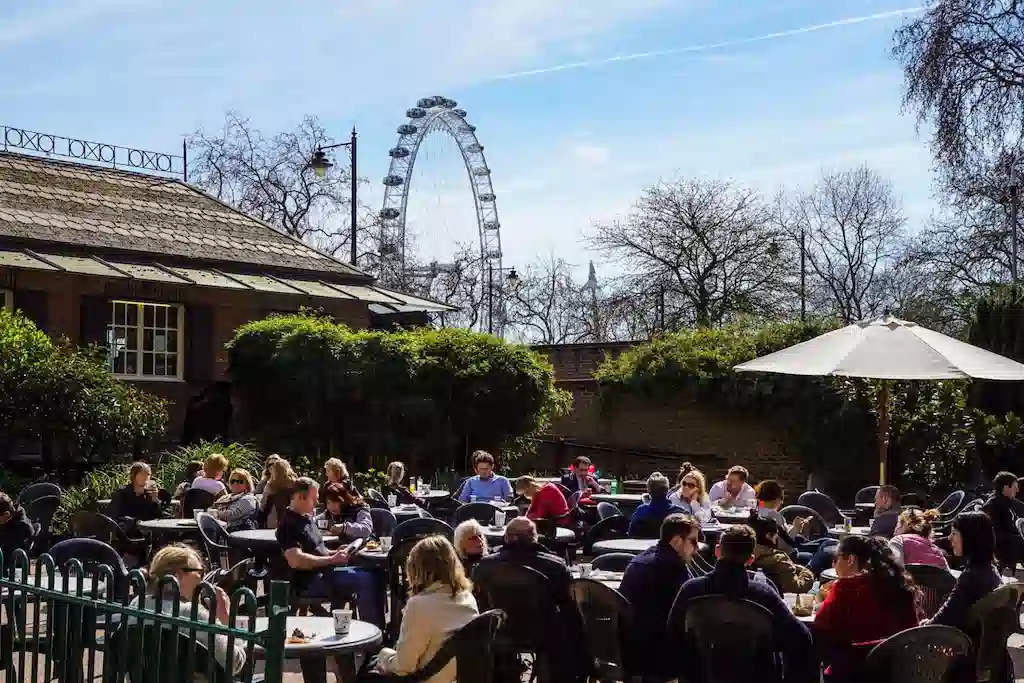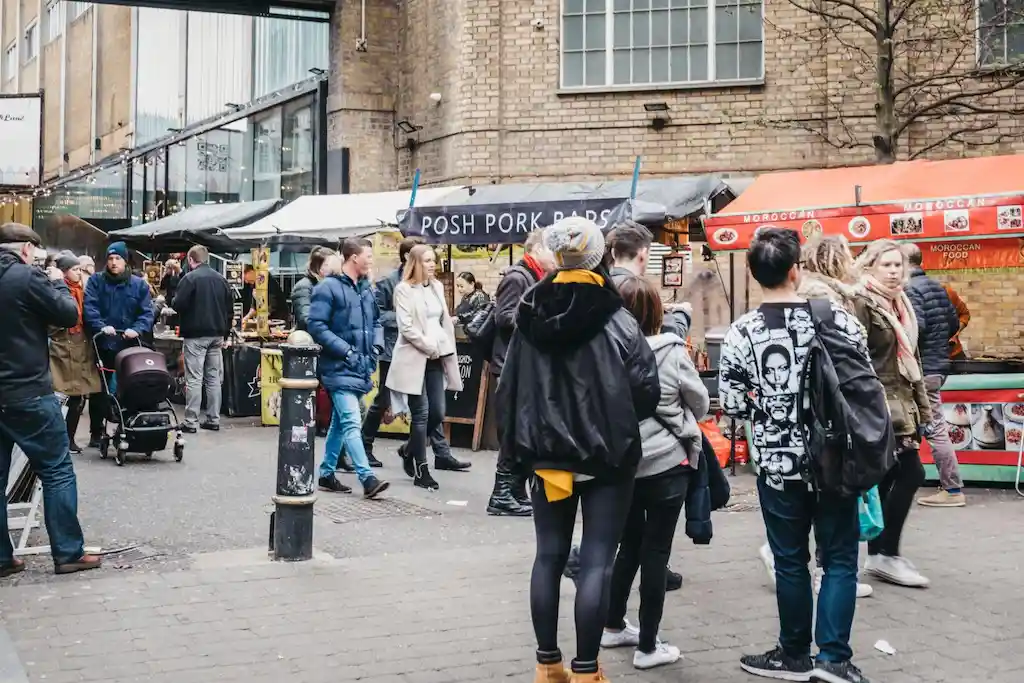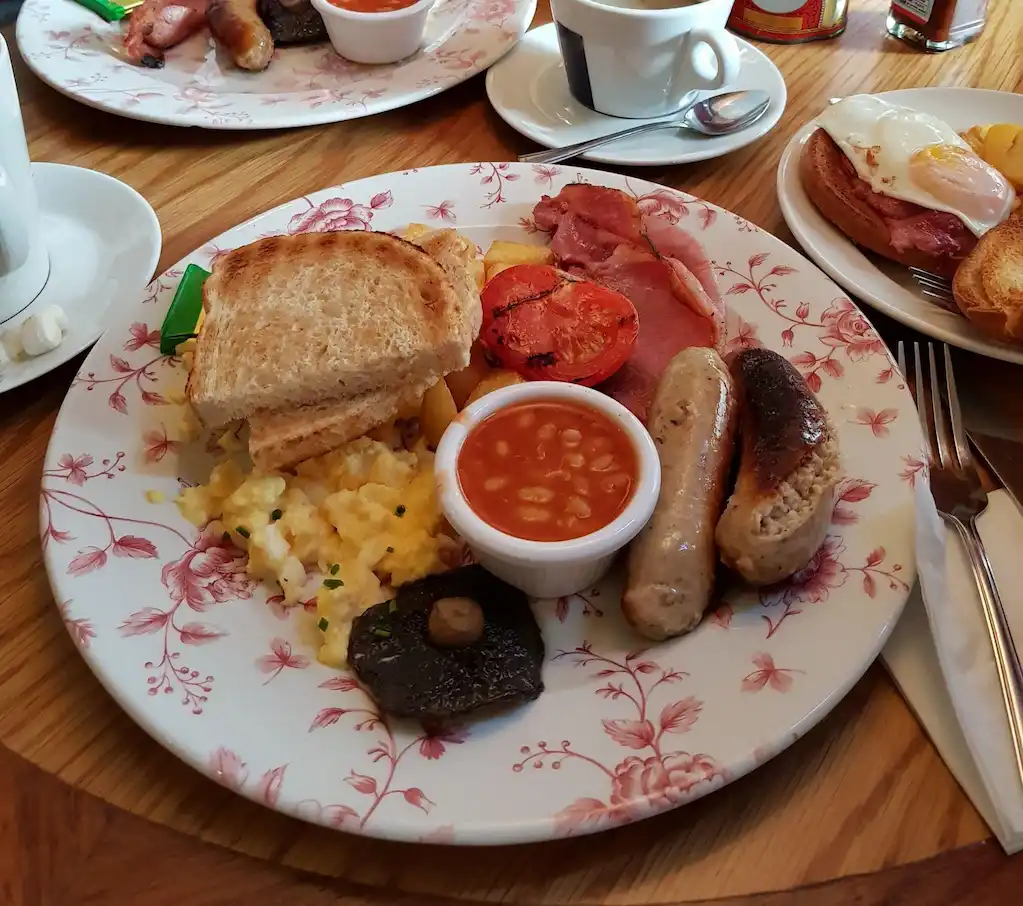Introduction to Camden Market:
Camden Market, located in the heart of London, stands as a vibrant and iconic marketplace known for its rich history, eclectic offerings, and diverse cultural atmosphere.
With a legacy dating back to the 1970s, Camden Market has evolved from a modest arts and crafts market into a dynamic hub that encapsulates the essence of urban creativity and global fusion. Nestled within its bustling streets are a plethora of stalls, boutiques, and vendors offering an array of products ranging from vintage fashion to handmade crafts.
However, one aspect that truly sets Halal Food in Camden Market apart is its remarkable selection of halal food options, reflecting the multicultural tapestry of the city and catering not only to religious observance but also to a wider audience that seeks unique and flavorful culinary experiences. As visitors wander through its labyrinthine alleys, they are not only greeted by an array of sights, sounds, and scents but also by the captivating allure of halal food that encapsulates the spirit of Camden Market’s inclusivity and cultural richness.
A brief overview of Camden Market’s popularity and significance:
Camden Market has risen to become one of the most renowned and iconic marketplaces not only in London but also globally. Its popularity and significance are a result of several factors that have contributed to its allure over the years.
Cultural Hub:
Camden Market serves as a melting pot of cultures, attracting both locals and tourists seeking a unique and authentic experience. Its diverse offerings and multicultural atmosphere create a sense of inclusivity that resonates with people from all walks of life.
Alternative Fashion and Arts Scene:
The market’s origins in the 1970s as a haven for alternative fashion, arts, and music subcultures have left an indelible mark. It remains a hotspot for vintage clothing, avant-garde designs, and underground music, contributing to its reputation as a trendsetting destination.
Historical Significance:
Camden Market’s historic roots as a former industrial complex lend it an industrial-chic ambiance that contrasts with its artistic and bohemian spirit. This blend of history and modernity adds to its unique charm.
Creative Expression:
Camden Market has long been associated with fostering creativity and individual expression. The market provides a platform for emerging artists, designers, and entrepreneurs to showcase their talents, contributing to its vibrant and dynamic atmosphere.
Music Scene:
The market’s connection to London’s music history is significant. Venues like the Roundhouse have hosted legendary performances, and the influence of music culture is evident in the various music-themed stalls and memorabilia.
Tourist Destination:
Camden Market draws millions of tourists annually, making it a must-visit location in London. Its distinctive ambiance, lively stalls, and captivating food scene create an immersive experience that captures the essence of the city.
Halal Food Offerings:
Among its myriad attractions, the inclusion of halal food options has expanded Camden Market’s appeal. This culinary diversity showcases not only the market’s adaptability but also its commitment to providing for a wide range of preferences and needs.
Architectural Aesthetics:
The architecture of Camden Market, with its cobblestone pathways, quirky storefronts, and iconic bridges, contributes to its photogenic and visually appealing character.
The Concept of Halal Food:
The concept of halal food is rooted in Islamic dietary laws and regulations, outlining what is permissible and lawful for Muslims to consume. Halal, which means “permissible” or “lawful” in Arabic, defines a set of guidelines that govern various aspects of food production, preparation, and consumption in accordance with Islamic principles.
Animal Slaughter:
One of the fundamental aspects of halal food is the method of slaughtering animals. The process involves reciting a prayer in the name of Allah (God) before the animal is slaughtered, ensuring that the animal’s life ends swiftly and humanely. The blood must be completely drained from the body, as consuming blood is considered prohibited in Islam.
Animal Source:
Only certain types of animals are considered halal. This includes animals that are herbivores and have cloven hooves, such as cattle, sheep, and goats. Seafood, provided it meets specific criteria, is generally considered halal as well. Pork and its by-products are strictly prohibited.
Prohibited Substances:
Certain substances and ingredients are not considered halal, such as alcohol and any intoxicating or harmful substances. Food products containing these ingredients are not permissible for Muslims.
Cross-Contamination and Processing:
To maintain the halal status of a food product, it’s important to prevent cross-contamination with non-halal items during processing, storage, and preparation. Dedicated utensils, equipment, and storage areas may be necessary to avoid contamination.
Certification:
Many halal food products are certified by reputable halal certification bodies, indicating that they have been produced and processed in accordance with halal requirements. This certification provides assurance to consumers that the food adheres to the prescribed standards.
Ethical Considerations:
The concept of halal food goes beyond the physical aspects of consumption. It also emphasizes ethical treatment of animals and respect for the environment. The principles of compassion and stewardship are integral to halal practices.
Spiritual Significance:
For Muslims, consuming halal food is a way to uphold their faith and maintain a connection to their religious practices. It reflects obedience to the dietary laws prescribed by Islam and fosters a sense of mindfulness in daily life.
Importance of halal dietary requirements for Muslims:
Submission to God’s Will:
Abiding by halal dietary rules reflects a Muslim’s submission to the will of Allah (God). It is an act of humility and an acknowledgment that God’s guidance extends to all aspects of life, including what they eat.
Mindful Consumption:
Following halal dietary rules fosters mindfulness in food consumption. Muslims are encouraged to be conscious of what they eat, how it’s prepared, and its impact on their bodies and spirituality.
Distinctive Identity:
Halal dietary requirements set Muslims apart in their dietary choices. It serves as a visual reminder of their faith and serves as a means of initiating conversations about Islam, helping to dispel misconceptions and promote understanding.
Connection to Tradition:
The practice of halal dietary requirements often stems from ancient traditions and texts. By following these practices, Muslims maintain a connection to their history and the teachings of their faith.
Types of Halal Food:
Halal food encompasses a wide variety of options from different cuisines and ingredients, all prepared and consumed in accordance with Islamic dietary guidelines. The specific types of halal food can vary based on cultural preferences, regional influences, and personal tastes. Here are some common categories of halal food:
Halal Meat:
This category includes various types of halal-slaughtered meat, such as beef, lamb, goat, and poultry. The meat must be prepared according to Islamic guidelines, ensuring proper slaughter and draining of blood.
Seafood:
Many types of seafood are considered halal, provided they are from permissible species and have been prepared correctly. Fish, shrimp, crab, and other seafood are commonly enjoyed by Muslims.
Grains and Legumes:
Halal food includes a wide range of grains and legumes such as rice, wheat, barley, lentils, chickpeas, and more. These are versatile ingredients used in various cuisines.
Fruits and Vegetables:
Fresh fruits and vegetables are considered halal, and they form an important part of a balanced halal diet. They can be enjoyed in their natural form or incorporated into dishes.
Dairy Products:
Dairy items like milk, cheese, yogurt, and butter are permissible as long as they come from halal sources and do not contain non-halal additives.
Bakery and Snack Items:
Many baked goods like bread, pastries, and snacks can be halal, provided they meet the criteria for halal ingredients and processing methods.
Spices and Flavorings:
A wide variety of spices and seasonings can be used to enhance the flavor of halal dishes. It’s important to ensure that these ingredients are halal-certified or naturally permissible.
Halal Certified Products:
Beyond specific types of food, there are also packaged and processed products that are certified halal by recognized halal certification organizations. These can include canned goods, sauces, condiments, and more.
Halal Fast Food:
Many fast-food chains around the world offer halal options or outlets to cater to Muslim consumers. These can range from burgers and fried chicken to pizzas and kebabs.
Halal Desserts:
A variety of desserts and sweets can be halal, including cakes, pastries, puddings, and traditional treats from different cultures.
Halal Drinks:
Non-alcoholic beverages, such as water, juices, teas, and coffees, are considered halal. It’s essential to avoid any drinks that contain alcohol or non-halal additives.
Ethnic and Regional Cuisine:
Different cultures and regions have their own halal dishes that reflect their culinary traditions. This includes dishes from Middle Eastern, South Asian, North African, and other cuisines.
Food Experience and Atmosphere:
Culinary Diversity:
Camden Market boasts a wide range of halal food vendors representing various cuisines from around the world. From Middle Eastern delicacies to Asian street food, visitors can explore an array of options that cater to different tastes and preferences.
Live Cooking and Interaction:
Some vendors offer live cooking demonstrations, allowing visitors to witness the preparation of their dishes. This interaction with the chefs adds a personal touch to the experience and provides insights into the culinary process.
Memorable Moments:
Whether it’s enjoying a savory dish, sharing laughter with friends, or simply soaking in the lively ambiance, the food experience and atmosphere at Camden Market create lasting memories.
Discussion of the quality and taste of halal dishes:
The quality and taste of halal dishes are pivotal aspects that contribute to the popularity and appeal of halal cuisine. Halal food offerings are not just about adhering to specific dietary guidelines; they also strive to provide delicious and satisfying culinary experiences. Here’s a discussion of the quality and taste of halal dishes:
Freshness:
Many halal dishes emphasize the use of fresh ingredients. Whether it’s tender halal meats or vibrant vegetables, the focus on freshness enhances the overall taste and texture of the dishes.
Attention to Preparation:
The method of halal animal slaughter, which emphasizes humane treatment and thorough blood drainage, can impact the flavor and quality of the meat. Properly slaughtered animals tend to have improved tenderness and taste.
Cultural Influence:
Halal dishes encompass a wide variety of global cuisines, each with its own unique flavor profile. Whether it’s the aromatic spices of Indian cuisine, the savory flavors of Middle Eastern fare, or the umami-rich elements of Asian dishes, the cultural influences contribute to diverse and delightful tastes.
Versatility:
Halal dishes can be found in a variety of culinary settings, from street food stalls to upscale restaurants. This versatility allows individuals to enjoy halal cuisine across different dining experiences.
Camden Market halal foods name:
Halal Burgers and Sandwiches:
Gourmet halal beef burgers with various toppings.
Chicken sandwiches with flavorful marinades and fillings.
Middle Eastern Delicacies:
Falafel wraps with tahini sauce and fresh vegetables.
Shawarma wraps or plates with tender halal meats.
Asian Street Food:
Tandoori chicken skewers served with naan and chutney.
Thai halal dishes like chicken satay or pad Thai.
Mediterranean Flavors:
Grilled kebabs with a variety of meats and vegetables.
Fresh salads with hummus, olives, and feta cheese.
Authentic Curries:
Fragrant and spicy halal curries from different regions.
Biryanis featuring aromatic rice and marinated meats.
Sweet Treats:
Halal desserts like baklava, Turkish delight, and rosewater-infused sweets.
Traditional Middle Eastern pastries filled with nuts and honey.
Fresh Seafood:
Grilled or fried halal seafood options like fish or prawns.
Gourmet Pizzas:
Pizzas topped with halal ingredients like halal pepperoni or chicken.
Exotic Drinks:
Fresh fruit juices, mocktails, or speciality halal drinks.
Side Dishes:
Samosas and other fried appetizers.
Freshly baked breads like naan or pita.
What is the best station for Camden Market?
Camden Market is most accessible via the Camden Town Tube station. Located on the Northern Line, this station provides direct access to the vibrant market. Its proximity ensures a seamless journey for visitors, allowing them to effortlessly immerse themselves in the diverse cultural and culinary offerings of Camden Market.
How do I check if something is halal?
To check if something is halal, look for halal certification labels from reputable organizations on packaged products. For fresh items, inquire about the sourcing and preparation methods. Many restaurants and markets also display halal signs. Verify with local halal authorities or online resources for authenticity and compliance with Islamic dietary guidelines.
Is it easy to find halal food in London?
Yes, it’s relatively easy to find halal food in London due to its diverse population. Numerous halal-certified restaurants, street food vendors, and markets offer a wide range of cuisines. Areas like Brick Lane, Edgware Road, and Camden Market are particularly known for their halal food options.
Is KFC actually halal UK?
Yes, many KFC outlets in the UK offer halal options. They have a dedicated halal menu that includes items prepared according to halal standards. However, the availability of halal options can vary by location, so it’s best to check with specific KFC outlets for confirmation before ordering.
Is Mcdonald’s halal or haram UK?
In the UK, some McDonald’s restaurants offer halal-certified options, while others do not. It varies by location, and only specific branches have a halal menu. To ensure you’re consuming halal food at McDonald’s, inquire with the staff or check the restaurant’s website for information about halal offerings in your area.

